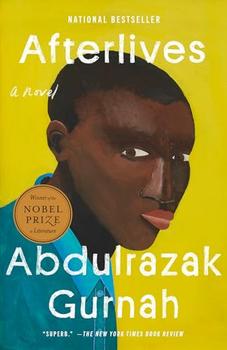Summary | Excerpt | Reviews | Beyond the Book | Readalikes | Genres & Themes | Author Bio

A Novel
by Abdulrazak Gurnah
Khalifa was not the tutor's only student. There were four of them, all Indian boys. They lodged with their teacher, sleeping on the floor in the downstairs hallway under the stairs where they also had their meals. They were never allowed upstairs. Their classroom was a small room with mats on the floor and a high barred window, too high for them to see out although they could smell the open drain running past the back of the house. Their tutor kept the room locked after lessons and treated it as a sacred space, which they must sweep and dust every morning before lessons began. They had lessons first thing and then again in the late afternoon before it became too dark. In the early afternoon, after his lunch, the tutor always went to sleep, and they did not have lessons in the evening to save on candles. In the hours that were their own they found work in the market or on the shore or else wandered the streets. Khalifa did not suspect with what nostalgia he would remember those days in later life.
He started with the tutor the year the Germans arrived in the town and was with him for five years. Those were the years of the al Bushiri uprising, during which Arab and Waswahili coastal and caravan traders resisted the German claim that they were the rulers of the land. The Germans and the British and the French and the Belgians and the Portuguese and the Italians and whoever else had already had their congress and drawn their maps and signed their treaties, so this resistance was neither here nor there. The revolt was suppressed by Colonel Wissmann and his newly formed schutztruppe. Three years after the defeat of the al Bushiri revolt, as Khalifa was completing his period with the tutor, the Germans were engaged in another war, this time with the Wahehe a long way in the south. They too were reluctant to accept German rule and proved more stubborn than al Bushiri, inflicting unexpectedly heavy casualties on the schutztruppe, who responded with great determination and ruthlessness.
To his father's delight, Khalifa turned out to have a talent for reading and writing and for bookkeeping. It was then, on the tutor's advice, that Khalifa's father wrote to the Gujarati banker brothers who had their business in the same town. The tutor drafted a letter, which he gave to Khalifa to take to his father. His father copied it out in his own hand and gave it to a cart driver to deliver back to the tutor who took it to the bankers. They all agreed that the tutor's endorsement was certain to help.
Honorable sirs, his father wrote, is there an opening for my son in your esteemed business? He is a hardworking boy and a talented if inexperienced bookkeeper who can write in roman and has some basic English. He will be grateful to you for his entire life. Your humble brother from Gujarat.
Several months passed before they received a reply, and only did so because the tutor went round to plead with the brothers, for the sake of his reputation. When the letter came it said, Send him here and we will try him out. If everything goes well, we will offer him work. Gujarati Musulman must always help each other. If we don't look after each other, who will look after us?
Khalifa was eager to leave the family home on the landowner's estate where his father was the bookkeeper. During the time they waited for a reply from the banker brothers, he helped his father with his work: recording wages, filling in orders, listing expenses and listening to complaints that he could not remedy. The estate work was heavy and the workers' pay was meager. They were often struggling against fevers and aches and squalor. The workers added to their food supplies by cultivating the small patch of ground the estate allowed them. Khalifa's mother Mariamu did that too, growing tomatoes, spinach, okra and sweet potatoes. Her garden was next to their cramped little house and at times the paltriness of their lives depressed and bored Khalifa so much that he longed for the austere time he spent with the tutor. So when the reply from the banker brothers came, he was ready to go and determined to make sure that they would retain him. They did so for eleven years. If they were at first surprised by his appearance they did not show it, nor did they ever remark on it to Khalifa although some of their other Indian clients did. No, no, he is our brother, Guji just like us, the banker brothers said.
Excerpted from Afterlives by Abdulrazak Gurnah. Copyright © 2022 by Abdulrazak Gurnah. Excerpted by permission of Riverhead Books. All rights reserved. No part of this excerpt may be reproduced or reprinted without permission in writing from the publisher.
Your guide toexceptional books
BookBrowse seeks out and recommends the best in contemporary fiction and nonfiction—books that not only engage and entertain but also deepen our understanding of ourselves and the world around us.